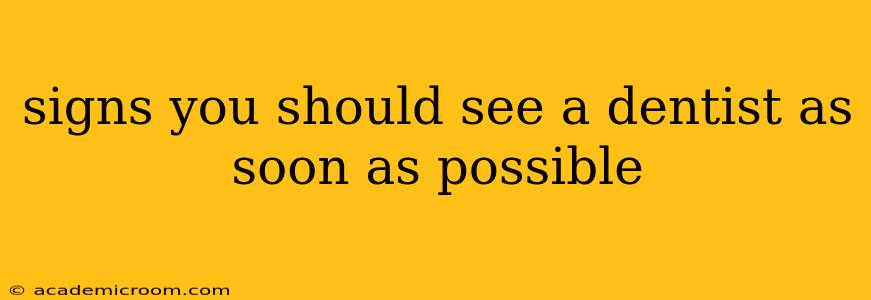Maintaining good oral hygiene is crucial for overall health. However, even with diligent brushing and flossing, problems can arise. Knowing when to seek immediate dental attention can prevent minor issues from escalating into major, and potentially costly, problems. This guide outlines key signs indicating you should schedule a dentist appointment as soon as possible.
Persistent Toothache or Sensitivity
A persistent toothache is a clear indication something is wrong. While occasional sensitivity to hot or cold can be normal, prolonged or intense pain warrants immediate attention. The pain might be throbbing, sharp, or dull, and could be accompanied by swelling or sensitivity to pressure. Delaying treatment can lead to infection, abscess formation, and even tooth loss.
Swollen Gums or Bleeding Gums
Swollen, red, or bleeding gums are often signs of gingivitis, the early stage of gum disease. Ignoring these symptoms can lead to periodontitis, a more severe form of gum disease that can damage the bone and tissues supporting your teeth. Regular dental checkups and professional cleanings are key to preventing gum disease, but if you notice significant swelling or bleeding, see your dentist immediately.
Loose Teeth or Changes in Bite
Noticing that your teeth feel loose or that your bite has changed could indicate a more serious underlying issue. This could be related to gum disease, trauma, or other dental problems requiring immediate professional assessment and treatment. Don't wait for the problem to worsen; address it promptly.
Facial Swelling or Jaw Pain
Swelling in your face, particularly around the jaw, can be a sign of a dental abscess, a serious infection requiring prompt medical attention. This infection can spread, causing severe complications. If you experience facial swelling alongside a toothache or jaw pain, seek immediate dental care.
Sores That Don't Heal
Mouth sores are common, but persistent sores that don't heal within a couple of weeks could be a sign of a more serious problem, such as oral cancer. Regular dental checkups are crucial for early detection, but if you have concerns about a non-healing sore, schedule an appointment immediately.
Sudden or Unexplained Tooth Sensitivity
While occasional sensitivity to temperature changes is common, a sudden onset of intense sensitivity, especially without an obvious cause, requires professional evaluation. This could indicate tooth decay, a cracked tooth, or other issues needing immediate attention.
What if I Have a Dental Emergency Outside of Office Hours?
Dental emergencies can occur at any time. If you experience severe pain, significant swelling, or uncontrollable bleeding outside of your dentist's office hours, immediately contact your dentist or seek care at an emergency room or urgent care facility. Many dental practices provide emergency contact information on their websites.
How Often Should I See My Dentist for Preventative Care?
The American Dental Association (ADA) recommends visiting your dentist for a professional cleaning and check-up at least twice a year. This preventative care can help detect potential problems early, preventing more serious and costly treatments down the line.
Disclaimer: This information is for general knowledge and does not constitute medical advice. Always consult with a qualified dental professional for any concerns regarding your oral health. This information is intended to provide guidance and should not be used as a substitute for professional dental care.
